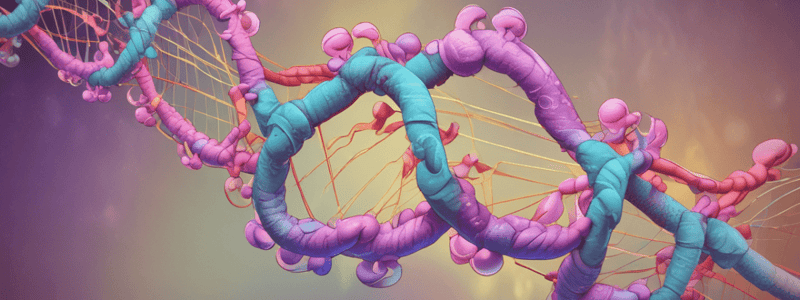Podcast
Questions and Answers
What is generated from an operon?
What is generated from an operon?
- Monocistronic transcript
- mRNA recognized by sigma factors
- Single polypeptide
- Polycistronic transcript (correct)
Which sigma factor is most commonly associated with recognizing promoter regions in bacteria?
Which sigma factor is most commonly associated with recognizing promoter regions in bacteria?
- Sigma 32
- Sigma 70 (correct)
- Sigma 54
- Sigma 24
How do regulatory proteins control gene expression?
How do regulatory proteins control gene expression?
- Through post-transcriptional modifications
- Through the binding of small molecules (correct)
- By modifying histones
- By degrading mRNA
What is the role of CAP in gene regulation when bound to cAMP?
What is the role of CAP in gene regulation when bound to cAMP?
Which inhibitor of RNA synthesis works by binding to the beta-subunit of RNA polymerase?
Which inhibitor of RNA synthesis works by binding to the beta-subunit of RNA polymerase?
How do bacteria respond to the presence of lactose in the medium with respect to beta-galactosidase production?
How do bacteria respond to the presence of lactose in the medium with respect to beta-galactosidase production?
Which of the following statements is true about the lifespans of synthesized RNA?
Which of the following statements is true about the lifespans of synthesized RNA?
Why is the error frequency higher in RNA synthesis compared to DNA replication?
Why is the error frequency higher in RNA synthesis compared to DNA replication?
What is the difference between a CORE ENZYME and a HOLOENZYME?
What is the difference between a CORE ENZYME and a HOLOENZYME?
Which sequence is located upstream of the transcription start site in prokaryotes?
Which sequence is located upstream of the transcription start site in prokaryotes?
What is the role of the σ factor in bacterial transcription?
What is the role of the σ factor in bacterial transcription?
How does termination of transcription occur at rho-independent sites?
How does termination of transcription occur at rho-independent sites?
What event occurs after the RNA polymerase releases the σ subunit?
What event occurs after the RNA polymerase releases the σ subunit?
Which component is necessary for the opening of the DNA strands around the start site?
Which component is necessary for the opening of the DNA strands around the start site?
What is the main reason why RNA polymerase is asymmetric?
What is the main reason why RNA polymerase is asymmetric?
What is the function of the rho protein in transcription termination?
What is the function of the rho protein in transcription termination?
What is the purpose of the -10 and -35 boxes in prokaryotic promoters?
What is the purpose of the -10 and -35 boxes in prokaryotic promoters?
What is the consequence of the lack of 3'-5' exonuclease proof-reading activity in RNA polymerase?
What is the consequence of the lack of 3'-5' exonuclease proof-reading activity in RNA polymerase?
What is the role of the sigma subunit in bacterial transcription?
What is the role of the sigma subunit in bacterial transcription?
What is the characteristic of the hairpin structure at rho-independent termination sites?
What is the characteristic of the hairpin structure at rho-independent termination sites?
What is the effect of a strong promoter on gene expression?
What is the effect of a strong promoter on gene expression?
What is the consequence of the closed complex formation between RNA polymerase and the promoter?
What is the consequence of the closed complex formation between RNA polymerase and the promoter?
What characterizes the mRNA produced from an operon?
What characterizes the mRNA produced from an operon?
Which sigma factor is specifically associated with heat shock response in bacteria?
Which sigma factor is specifically associated with heat shock response in bacteria?
What happens to LAC repressor when lactose is bound?
What happens to LAC repressor when lactose is bound?
How does actinomycin D inhibit RNA synthesis?
How does actinomycin D inhibit RNA synthesis?
What effect does cAMP binding have on the CAP protein in bacterial gene regulation?
What effect does cAMP binding have on the CAP protein in bacterial gene regulation?
Which environmental condition leads to high levels of beta-galactosidase in bacteria?
Which environmental condition leads to high levels of beta-galactosidase in bacteria?
Flashcards are hidden until you start studying
Study Notes
RNA Synthesis
- A single RNA polymerase synthesizes all types of RNA: rRNA, tRNA, and mRNA
- rRNA and tRNA are stable once synthesized, whereas mRNA is unstable with a half-life of 2 minutes
- RNA synthesis requires a DNA template and riboNTPs
Error Frequency and Proofreading
- Error frequency in RNA synthesis is 1 per 10^4 nucleotides, higher than DNA replication
- This is because RNA polymerase lacks 3'-5' exonuclease proofreading activity and there are no other correction mechanisms
RNA Polymerase Structure
- Core enzyme contains α2, β, and β' subunits
- Holoenzyme contains α2, β, β', and σ subunits
- σ subunits are less abundant than core subunits
- RNA polymerase is asymmetric, having two alpha subunits and only one of the other subunits
Promoters and Transcription Initiation
- Promoters are transcription start sites recognized by a core RNA polymerase associated with a σ factor
- Consensus sequence maximizes homology, including the -10/Pribnow box and -35 box conserved upstream of the start site
- Promoter is asymmetric, matching the asymmetric RNA polymerase structure
- Holoenzyme binds to the promoter without opening DNA strands (closed complex)
- Strands of DNA are opened around the start site (open complex), and selection of NTPs occurs
Transcription Elongation and Termination
- RNA-DNA duplex is broken, and polymerase dissociates
- Rho-independent sites terminate transcription due to a GC-rich hairpin followed by 6 uracils
- Rho-dependent sites have a hairpin but no U tract, preceded by a cytosine-rich region
- Rho (ATP-dependent helicase) binds to the cytosine-rich RNA, unwinding the RNA-DNA complex
Regulation of Gene Expression
- Regulation is partly due to promoter efficiency and regulatory proteins controlling access to RNA polymerase
- Promoters have different efficiencies due to sequence differences
- Operon: a set of genes controlled by one promoter, producing a polycistronic transcript
- Sigma factors recognize different promoter regions, regulating gene expression
- Regulatory proteins: repressors block RNA synthesis, while positive regulators enhance RNA polymerase activity
Examples of Gene Regulation
- Lac repressor and CAP regulator: repressor blocks RNA synthesis when bound to DNA, while positive regulator enhances RNA polymerase activity
- Bacteria change protein expression in response to environmental conditions, such as the induction of β-galactosidase in the presence of lactose
Inhibitors of RNA Synthesis
- Actinomycin D inhibits RNA synthesis by binding to dsDNA between GC pairs
- Rifamycin, an antibiotic, binds to the β-subunit of RNA polymerase, blocking bacterial synthesis and used to treat tuberculosis
RNA Synthesis
- A single RNA polymerase synthesizes all types of RNA: rRNA, tRNA, and mRNA
- rRNA and tRNA are stable once synthesized, whereas mRNA is unstable with a half-life of 2 minutes
- RNA synthesis requires a DNA template and riboNTPs
Error Frequency and Proofreading
- Error frequency in RNA synthesis is 1 per 10^4 nucleotides, higher than DNA replication
- This is because RNA polymerase lacks 3'-5' exonuclease proofreading activity and there are no other correction mechanisms
RNA Polymerase Structure
- Core enzyme contains α2, β, and β' subunits
- Holoenzyme contains α2, β, β', and σ subunits
- σ subunits are less abundant than core subunits
- RNA polymerase is asymmetric, having two alpha subunits and only one of the other subunits
Promoters and Transcription Initiation
- Promoters are transcription start sites recognized by a core RNA polymerase associated with a σ factor
- Consensus sequence maximizes homology, including the -10/Pribnow box and -35 box conserved upstream of the start site
- Promoter is asymmetric, matching the asymmetric RNA polymerase structure
- Holoenzyme binds to the promoter without opening DNA strands (closed complex)
- Strands of DNA are opened around the start site (open complex), and selection of NTPs occurs
Transcription Elongation and Termination
- RNA-DNA duplex is broken, and polymerase dissociates
- Rho-independent sites terminate transcription due to a GC-rich hairpin followed by 6 uracils
- Rho-dependent sites have a hairpin but no U tract, preceded by a cytosine-rich region
- Rho (ATP-dependent helicase) binds to the cytosine-rich RNA, unwinding the RNA-DNA complex
Regulation of Gene Expression
- Regulation is partly due to promoter efficiency and regulatory proteins controlling access to RNA polymerase
- Promoters have different efficiencies due to sequence differences
- Operon: a set of genes controlled by one promoter, producing a polycistronic transcript
- Sigma factors recognize different promoter regions, regulating gene expression
- Regulatory proteins: repressors block RNA synthesis, while positive regulators enhance RNA polymerase activity
Examples of Gene Regulation
- Lac repressor and CAP regulator: repressor blocks RNA synthesis when bound to DNA, while positive regulator enhances RNA polymerase activity
- Bacteria change protein expression in response to environmental conditions, such as the induction of β-galactosidase in the presence of lactose
Inhibitors of RNA Synthesis
- Actinomycin D inhibits RNA synthesis by binding to dsDNA between GC pairs
- Rifamycin, an antibiotic, binds to the β-subunit of RNA polymerase, blocking bacterial synthesis and used to treat tuberculosis
Studying That Suits You
Use AI to generate personalized quizzes and flashcards to suit your learning preferences.




